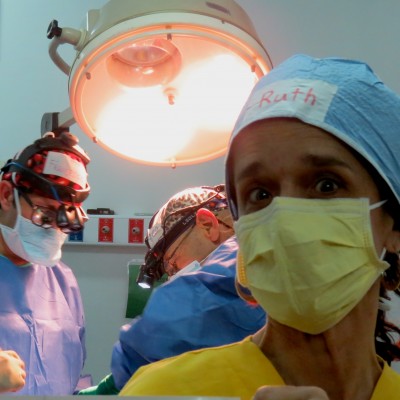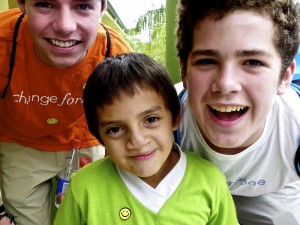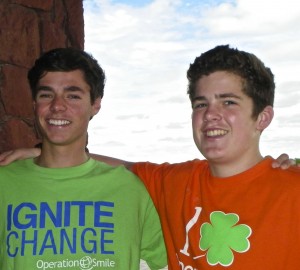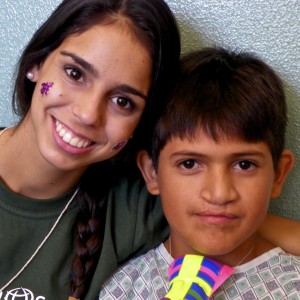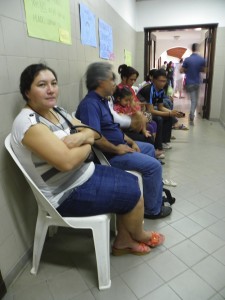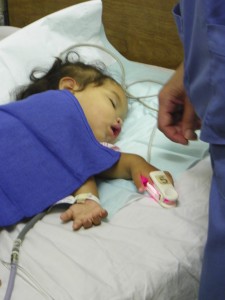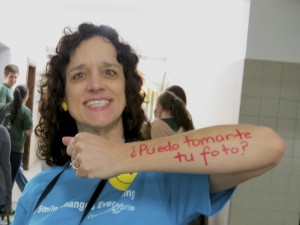
PART 1 PART 3
PART 2
12 Days that Changed My Life
and the Lives of
100 families.
Surgeries begin today. Another day filled with big adventures-lots to learn and people to meet. As a first timer, even though I really did pay attention and take notes during training, I go into this situation with a sketchy idea of what I will be doing to help the team. Clearly there is much to learn now that we are here.
One of my main responsibilities is to look out for the two teenagers from the U.S. who are part of the team. Operation Smile has clubs at high schools all over the world where students work to raise money to fund the medical missions. Two students, who have been active in their club and have attended trainings, go on every mission. Their role is to educate the
children and families about various health related issues and to play with the kids during what can be very long waiting periods. Teenagers were incorporated into the process early on in Operation Smile’s existence, when 30 years ago, the Magees (the founders) brought their own children with them on the first missions. It became abundantly clear that having a couple of people free of any medical duties, and able simply to play with the kids and reassure the parents, was extremely valuable.
I could not have been luckier with the two teens I was assigned. Hunter and Brendan (a high school Senior and a Junior) were great! They needed little oversight and were great at jumping in. I’m not so sure that I, as a self conscious teen, would have had their level of chutzpah.
Yesterday on announcement day when families learn if their child will be getting surgery, my boys were total rock stars! They set up a table with toothbrushes and toothpaste and did the dental hygiene presentation all day long just outside the psychologist’s door where the parents and children exited.
They were able to talk with each family one at a time, giving them toothbrushes and toothpaste, and the hygiene instructions. They presented the dental hygiene module a zillion times that day, and in a way that was culturally sensitive and to an audience that was receptive, not distracted, and thus able to attend to what they were hearing. Additionally, the boys were able to say to each child/parent, “See you on ____day!” and “I’ll be there to take you to the operating room.” I have to say that may have been the hugest thing they did–they gave the parents a face to look for for comfort and support during a time when they were handing their child over for surgery to people with whom the could not easily communicate. The boys’ reassuring smiles were in a language they could understand.
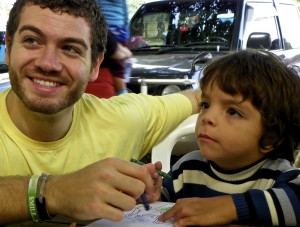
Joey, our fearless and competent leader from Operation Smile headquarters. He juggled a hundred balls in the air and just kept on smiling (here smiling and coloring).
The three of us, the American Play-ologists, arrived at the hospital everyday with our bags of bubbles, crayons, puzzles, hot wheels, stickers and pipe cleaners. The children having surgery had checked in the night before. Entire families had slept on the ward. The families were nervous. The kids were hungry and thirsty! It was our job to help both groups get through the day.
I found my role pretty quickly. As each child’s turn came, they and their parents were ushered into the area just off of where the Operation Rooms were. With the assistance of a translator the anesthesiologist met with the parents and did one last assessment of the child. (Local teens, who have been active in their Operation Smile Club, serve as translators for the mission. Everyday about 15 local high schoolers joined us and helped the medical personnel and families communicate. How cool to be 16 and assisting a surgeon to explain a procedure and a parent to explain their concerns.).
So what did I do here? No medical know how. Not much Spanish in this old noggin. But I am a mama. I became the Lovey-Dovey Parent Caretaker. Imagining what it must feel like to hand your child over to someone you’ve only just met, I decided they needed a little, no make that a lot, of TLC.
The medical staff had no time on their hands. I had only time. A nurse might simply call out a patient’s name and lead the family in. I had been playing with the kids and cajoling the parents. I knew them beyond the name and number on their hospital bracelet.
Whenever possible, I took on the responsibility of getting the families. My technique included hugs, arm squeezes, thumbs ups, hand holding, tickles and bubble blowing. It wasn’t much, but it was a lot. I sat with them while they met with the doctor. If they looked bewildered, I asked questions hoping to clear up their concerns. And when it was time to hand their baby over, I made sure they got enough kisses. And then since there is no such thing as enough, one more kiss.
And almost without exception, when I walked them out to the waiting area the questions they were too scared to ask the doctor, they asked me. It was a profound realization that these parents so wanted their children to be chosen for the surgery, that mom and dad weren’t going to take the chance of being perceived as the problem parent by asking a lot of questions.*
I walked them to the waiting area holding their hands or with an arm around their trembling shoulder. The SOP was for parents to simply walk down the hall to the waiting chairs. Instead I walked them there, with the empathy of a fellow parent. It was as if, by being kind, I gave them permission to cry. And cry they did. The whole stiff upper lip thing, isn’t really the way to go. Crying is such a great release when the situation is filled with tension and fear.
During the 1-3 hours that they waited, I stopped by and gave updates. I didn’t really need to know any medical specifics. What they needed to hear was: so far so good, it’s going well, thumbs up from the doc, about another hour, . . .
I was the Lovey-Dovey Guide. My day consisted of guiding them to the operating area, to the waiting area and then into recovery. It was an honor to be the one who brought mom or dad back to the Recovery Room to see their child’s new smile for the very first time. Lots of tears. Lots of hugs. Lots of smiles.
The parents were, of course, thankful. I hope they realize that we are thankful for the opportunity to hold their hand.
Smile. Be happy.
Ruth
* What I perceived as the parents’ reluctance to rock the boat, for fear their child might be excluded, also became apparent as everyone pulled out their cameras. These were extremely intimate moments in these family’s lives. We all were careful to ask permission before taking pictures, but truthfully I soon came to understand that they probably felt they had to say yes. After the first day of surgeries, I put my camera away.

